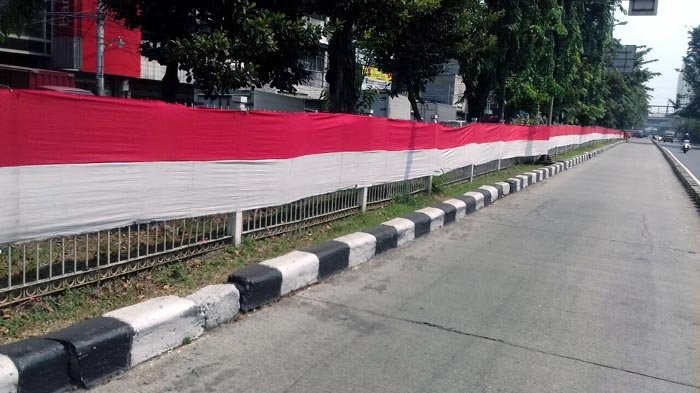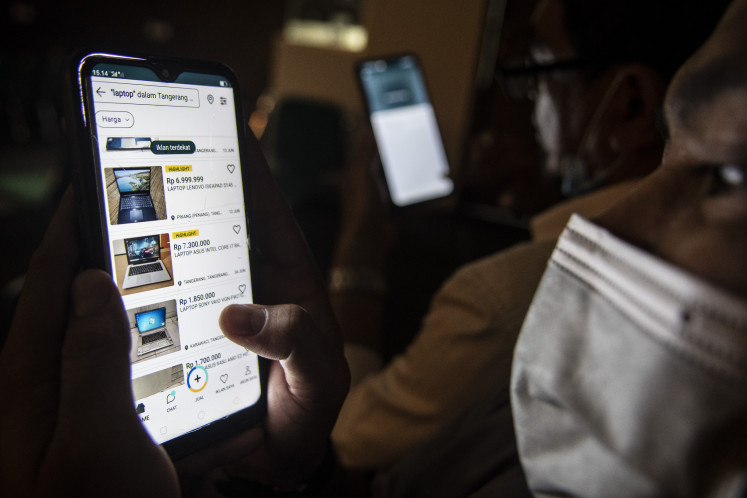Popular Reads
Top Results
Can't find what you're looking for?
View all search resultsPopular Reads
Top Results
Can't find what you're looking for?
View all search resultsINSIGHT: Indonesia – a nation of three clichés
Cliché number one: Indonesia is rooted in the spirit of gotong royong.
Change text size
Gift Premium Articles
to Anyone
A
ug. 17 is the day Indonesia looks at itself and likes what it sees. The life of a nation is made up of moments, and its genesis deserves a cheer. Across the country, a paean is sung in praise of the homeland, a respite from the clamor of dayto-day scrambles. There is merit in the momentary flight from realism to hero-worship. Life needs re-enchantment.
Of course, reality will bite again with a sense of routine. It is in the routine that life is shaped. But the routine is also the locus of unthinking: we believe in things just because they have always been there. Things become familiar and banal. A life made up of clichés is a world where there is little to learn. That’s why to celebrate is to be elated without losing an eye for renewal. There is no renewal without shaking ourselves from clichés that consign us to a sense of timeless unchanging. Among the many, let us take a look at just three of the biggest clichés.
Cliché number one: Indonesia is rooted in the spirit of gotong royong. This sounds native but it is little more than a catch-all term for solidarity, that a nation is a project built through joint efforts. Ernest Renan, that romantic high-priest of French nationalism, said in 1882, “a nation is a grand solidarity.”
Yet, gotong royong is often construed as antithetical to individuality. Precisely because the former is submerged under the latter, the whole project of gotong royong fails. The reason is also plain. In order to work, gotong royong requires flourishing individuality. It’s called individuation, in which a citizen becomes a person capable of free will with the capacity to act against the collective stampede.
In an orchestra, each musician is required to be a skilled individual player. Individually incompetent members only result in a noise stampede. Similarly in nation-building, only citizens with adequate individuation can contribute to gotong royong. Even genuine socialism assumes flourishing individuality among its citizens.
Instead of nourishing solidarity, all talk about gotong royong risks being a pretext for tribalism, “right or wrong, my group comes first.” Its pathology in the form of the religious bigotry now suffocating the country is there for all to see. It is tribalism devoid of individuated citizenship, incapable of acting against groupthink, with low respect for dignity and leading to electoral democracy enacted along tribal lines.
Cliché number two: religion is the key to Indonesia’s sanity. Often this idea is coughed up when the cure to the country’s ills is prescribed as the injection of more religion. More schools and universities then become keener on prayer than study. The virtue of a citizen is seen as manifested in religious symbols: from talk to dress, from prayers to ways of addressing one another. Instead of better citizens, it breeds bigots and hypocrites.
That our public life is increasingly marked by this atavism is a measure of how the nation has been cannibalized by a blinkered notion of religion. All this has less to do with theology than a naked power struggle among — you know who — political entrepreneurs. Sadly, what starts as a mere electoral tool ends up becoming a doctrinal conviction among ordinary citizens. What happened during the 2017 Jakarta gubernatorial elections should serve as a lesson that just because something seems absurd does not mean it will not happen.
The irony is plain. No country whose population talks incessantly about religious matters enjoys a salubrious life as confirmed by the global survey by the Pew Research Center (20112013). One explanation for this is that less time and energy is then spent on the toils and troubles of improving mundane conditions. People obsessed with heaven can never be good citizens. To fanatics this sounds like heresy, to me it is sanity.
Cliché number three: improving the nation depends on government policy. Policy is a political directive steering an organized life (polis) to move from, say, condition X1 to X2 — with the latter seen as an improvement. Policy is why there is government; government without policy loses its raison d’être. The problem is, the transformation aimed at can never happen by policy fiat. And here lies the puzzle.
Deeply shaped by economic logic, policy works as incentives or disincentives injected into citizens’ behaviors. The Central Bank lowers interest rates as an incentive to boost investment; penalties are made more severe as a disincentive for corruptors. Bluntly put, citizens are expected to act in the way Pavlov dogs change their behaviors according to injected stimuli. This is technocracy at its best, and there is nothing necessarily wrong with this mode of transformation.
People may change according to the policy, then continually change as policy shifts. This is magic, transformation by policy sorcery. But then we become infantile citizens at the whim of policy. What is missing is the pedagogical part. It is encouraging, for instance, that changes from corrupt to non-corrupt behaviors are triggered by incentives/disincentives.
But unless the same policy is equipped with learning how to move from corrupt to non-corrupt behaviors, and citizens gradually see the latter not only rewarding but good, the nation’s renewal remains a mirage. This is true for many things that make up the tapestry of the nation’s life. Policy-making should include not just technocrats or bureaucrats but educators.
All this may be annoying. Selfcriticism is an eye that sees a halffull glass as also half-empty. But not to spoil the half-full, let us savor the day when the nation is enjoying a gleeful moment in the sun.










